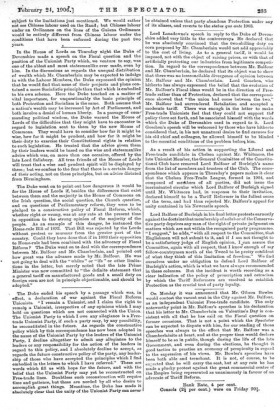The Duke went On to point out how dangerous it
would be for the House of Lords if, besides the differences that exist between them and the majority in the House of Commons on the Irish question, the social question, the Church question, and on questions of Parliamentary reforth, they were to be pledged to a constructive policy of Fiscal Reform, which, whether right or wrong, was at any rate at the present time in opposition to the strong opinion of the majority of the people. As an example of this danger, he instanced the Home-rule Bill of 1893. That Bill was rejected by the Lords without protest or murmur from the greater part of the country. Could they have done that if in 1893 their opposition to Home-rule had been combined with the advocacy of Fiscal Morin P The Duke went on to deal with the correspondence between Mr. Balfour and Mr. Chamberlain, and pointed out how great was the advance made by Mr. Balfour. He was not going to deal with the "whiles" or " ifs " or other limita- tions in the letter, but merely noted that the late Prime Minister was now committed to "the definite statement that a general tariff on manufactured goods and a small duty on foreign corn are not in principle objectionable, and should be adopted."










































 Previous page
Previous page